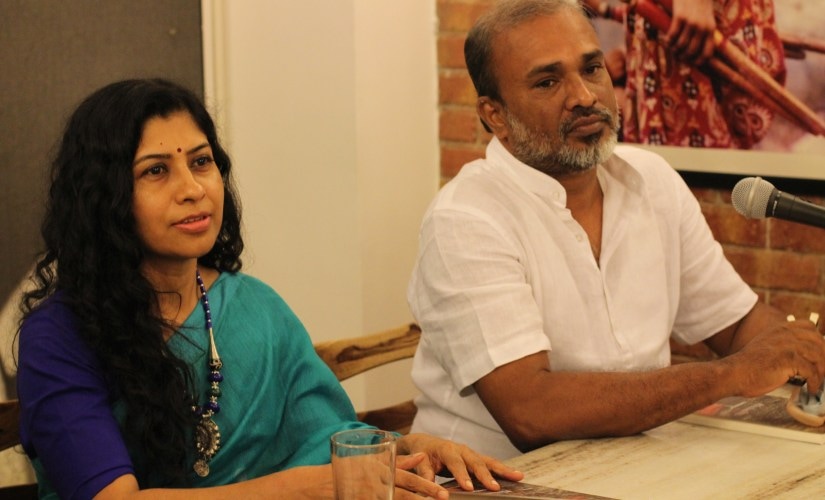Ahilan’s poetry bears powerful testimony to Sri Lankan civil war
by Kavitha Muralidharan, ‘FirstPost,’ Delhi, October 6, 2018
We are here now.
Eating without hands,
Seeing without eyes
Walking on wooden stumps
We are here,
Beneath your shining silk banners
It is us.
We are here,
Under your umbrella,
Splashing fire ceaselessly
On the oozing pus
From the enduring wound
Looking up to you,
It is us,
The defeated
(2013)
From Then There Were No Witnesses
Five years after the bloody civil war in Sri Lanka came to an end, Ahilan wrote these verses. The war might have been over, but the scars were still fresh. Carrying the labels of the defeated, many Tamils in the island nation walked around baring their wounds, inside out. In a way, the poem (titled The Defeated) by Ahilan was representative of this post-war trauma that many Tamils were to face.
Through the 30 years of the civil war, the Sri Lankan Tamil literary landscape produced numerous poets and writers with distinct voices that told the world what the mainstream news wouldn’t. Their poetry spoke of horrors of war, the trauma of violence, and the pain of exile. Ahilan’s was one among many such voices but unique in its own way. Almost through the thirty years of the civil war, Ahilan wrote poetry that now serves as witnesses to the various phases of war and its aftermath. Ahilan’s poems are at once chilling and sensitive. He writes with as much poise about meeting a long lost lover as about losing a loved one in a ‘cruel space.’

In Then There Were No Witnesses, a bilingual poetry collection (Tamil and English/translated by Geetha Sukumaran) recently published by Mawenzi House, Ahilan revisits the three decades of war and aftermath, the landscape that his poetry had traversed, and in the process introduces to the reader a life ravaged by war, yet held together by love. Celebrated writer Michael Ondaatje calls the collection a “powerful, essential book that should be read by all, to understand the unofficial truth of a war in any country where ‘the watchtowers lying awake/on the face of the sea/do not rest.’”
Ahilan says working on the poetry collection was like experiencing the pain again. “The memories came surging, it was like living the pain and disease all over again. The armed conflict is over but we still live in an unfinished war.”
For Geetha Sukumaran, an acclaimed translator who had earlier translated Sylvia Plath into Tamil, working on Ahilan was almost providential. “I really did not choose his poetry, rather his poetry took over me. I got lost in his minimalist diction that converges culture, philosophy and Tamil literary tradition and the sharpness of his imagery and metaphors he drew. To me, the shift in his language after 2009 distinctly echoed the much-argued views of Adorno’s remarks on poetry after Auschwitz and I see it as a language of trauma as the poet himself writes about his form. Obviously, I am not comparing the Holocaust and the Sri Lankan conflict, my interest lies in how language reflects violence. I think it is such aspects and the various layers interlaced in the work that induced me to translate them. This stylistic element makes his poetry a significant work in the Tamil poetic scene,” Geetha says.
Geetha also feels there is a strong connection between her current translation of Ahilan and her previous one of Sylvia Plath. “Both poets speak through powerful metaphors and both have internalised their struggles and communal memory in different ways. Plath has used the communal violence of the Holocaust to engage with her personal battles while Ahilan’s poetry constantly moves between communal violence and personal trauma. Although there has been much criticism of Plath for personalising the Holocaust, during her time there were no poets who had not touched upon anxieties relating to World Wars and post-war realities ie postmodernity. If Plath’s is an experience of the periphery which gets internalised, Ahilan’s is the core that manifests in mind and memory and reverberates at various levels,” she concurs.

Geetha Sukumaran with Ahilan. Image courtesy of the author
But the challenges entailing the translations were different. “I think the main difference lies in working with a poet who’s alive. Plath’s work is well known for ambiguities and I had to heavily rely on many secondary readings and my own sense of poetry. While Ahilan, being a contemporary poet, made it easier to approach him whenever I was not sure of certain words, phrases or references. Particularly, the allusions and the historical references he makes about the conflict are all so subtle that before making my notes I had to make sure what exactly he meant. So my interpretation is, in a way, a dialogue between the translator and the poet, the text and the author.”
For Ahilan himself, his poetry is about speaking things that ‘they do not want to hear.’ “I want to keep talking over and over again, things they don’t wish to hear. The things they deny or bury. Things they don’t know. I think getting my poetry translated into English has helped me somewhat achieve this.”
But it is not just about his poetry. Ahilan thinks the post-war scenario has heralded a new voice in Sri Lankan Tamil literary landscape. “It heralds things new to Tamil. It speaks about destruction, about metamorphosis. I think much needs to be spoken about the literature itself.”
From a poem that speaks about houses saturated with blood in 2005 to another that raises the question about the whereabouts of ‘her child with the everlasting smile’ in 2017, Ahilan’s poetry serves as witness to various facets of war-ravaged personal lives. In doing so, Then There Were No Witnesses translates itself into a powerful testimony to one of the bloodiest wars our generations have seen.

